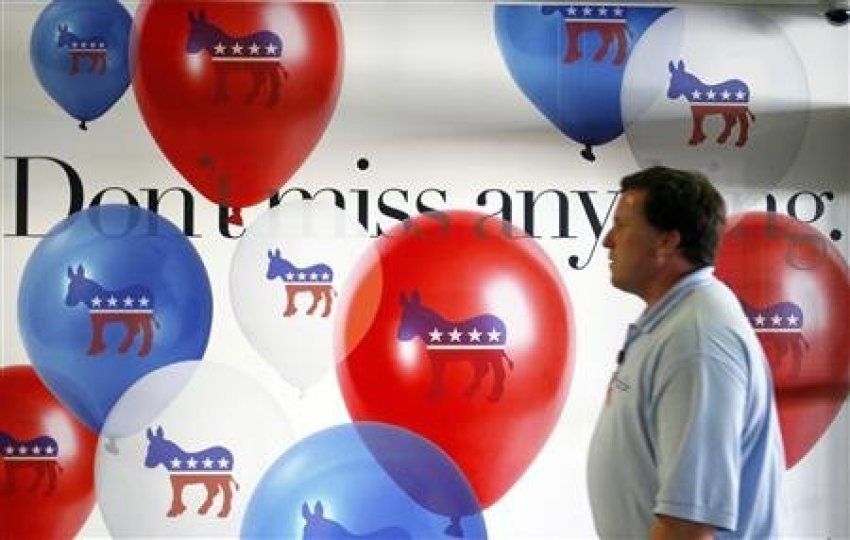Political Party Analysis: Democrats Will Lose Elections if They Don't Fix Their Religion Problem (Part 2)

Within their coalition, the Democratic Party has both those who believe religion causes harm and those who find great value in their religious faith. Much of the party's future will depend on how party leaders navigate these opposing views.
Part one of this series pointed out that the Democratic Party represents well both the non-religious and racial minorities. In the future, however, the religious in America will be mostly non-whites and the non-religious will be mostly whites. To win elections, therefore, the party will need to manage the differences between these groups.
One can, of course, be non-religious without being anti-religion. A problem for Democrats, though, is that some of the loudest voices from the secular left in recent years have demonstrated suspicion or open hostility toward religiously motivated viewpoints. In such an environment, the more that liberalism becomes associated with secularism, the more difficult it will be for the Democratic Party to mobilize those for whom religion motivates liberal political beliefs.
In an April report on mobilizing religious progressives, Brookings Institution senior fellows E.J. Dionne and William Galston put it this way: "If the decline in religion's public standing hinders the Christian conservative movement, it also makes it difficult for progressive religious leaders to win the hearing they are seeking. It therefore hinders the creation of potentially fruitful secular/religious alliances on behalf of economic justice. This is a serious loss for justice advocates."
There have been many recent examples of liberals attempting to bully and silence conservatives and people of faith. (See, for example, here, here, here, here, here, here, here and here.)
A party coalition that requires homogeneity amidst a sea of heterogeneity will not long stay together.
Dionne and Galston quoted Michael Wear, leader of the religious outreach for President Barack Obama's 2012 election campaign, who said that Democrats are "finding it increasingly difficult to include a diverse array of faith voices, particularly those who hold traditional positions on social issues. Some religious leaders who were able to be engaged four or eight years ago are now off the table for holding the same views that they have always held."
To maintain its broad coalition of both religious and non-religious, Democrats need to welcome diversity, condemn those who bully people of faith, and champion religious freedom.
Until recently, liberals have been strong supporters of religious freedom. This makes sense because religious freedom is consistent with the liberal values of tolerance and pluralism. In 1990, for instance, three of the Supreme Court's most liberal justices, Harry Blackmun, William Brennan and Thurgood Marshall, dissented in a religious freedom case written by one of the court's most conservative justices, Antonin Scalia. The case, Oregon vs. Smith, involved the use of peyote, an hallucinogenic used as part of a religious ritual by the Native American Church but banned in Oregon.
Two Native Americans were fired from their government jobs and denied unemployment compensation after they failed a drug test because they ingested peyote while participating in a religious service. They sued the state, arguing that the religious freedom clauses of the First Amendment protected their right to participate in their religion.
The Court ruled against the Native Americans. Scalia's opinion argued that Oregon did not violate their religious freedom because the law against the use of hallucinogens applies equally to all religious faiths and did not single out the Native American Church.
The dissenters noted that the Court's majority opinion was a radical departure from how the First Amendment had been interpreted. Prior to Smith, the Court ruled that a law could violate a person's religious freedom only if it passed "strict scrutiny," which means that the government has to have a compelling interest in passing the law, the law must be narrowly tailored to achieve its goal and the government must use the least restrictive means for achieving that goal. In other words, for the government to violate a citizen's religious freedom, it must have a really good reason for doing so and there must be no other way to achieve that goal without infringing upon religious freedom.
Scalia abandoned the strict scrutiny test and wrote that religious freedom can be infringed as long as the government action is generally applicable, or is not designed specifically to infringe upon religious freedom. The Court's liberal dissenters appealed to tolerance and pointed out that religious freedom would have little meaning if the state can infringe upon religious freedom simply by passing generally applicable laws.
The majority's "distorted view," Blackmun wrote, led it "to conclude that strict scrutiny of a state law burdening the free exercise of religion is a 'luxury' that a well-ordered society cannot afford, and that the repression of minority religions is an 'unavoidable consequence of democratic government.' I do not believe the Founders thought their dearly bought freedom from religious persecution a 'luxury,' but an essential element of liberty — and they could not have thought religious intolerance 'unavoidable,' for they drafted the Religion Clauses precisely in order to avoid that intolerance."
In response to the Court's Smith decision, a Democratic-controlled Congress passed the Religious Freedom Restoration Act to do what three of the Court's liberals believed should have been done in the first place — apply the strict scrutiny standard to religious freedom cases. Though there was much debate as RFRA made its way through the legislative process, in the end it gained broad support. It passed the Senate 97-3 and passed the House on a unanimous voice vote. A Democratic president, Bill Clinton, signed the law in a White House ceremony, and he continued to cite it among his list of accomplishments as president.



























